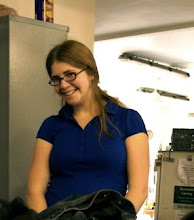(Psalm 99:1)
This blog post was originally supposed to be about the drought here in Israel. The Sephardi Chief Rabbi of Israel declared yesterday, Thursday, a fast day. Rav Amar said, "Because of our sins the water situation is in a serious state. Our duty in this situation is to scrutinize and examine our actions and bring ourselves close to God with all our hearts. We must be repentant with broken hearts and anyone who is able should fast, if not a whole day, at least a half day." This is a tradition, that when winter hasn't been wet enough, the chief rabbi will call for the entire country to fast (which doesn't happen) in hopes of bringing the rain. I was going to write about communal responsibility taking care of our world, both spiritually and practically.
But then a 7.0 earthquake hit Haiti. If I were in the States this weekend, any synagogue that I might find myself in for Shabbat would be acknowledging the crisis and suffering, praying for the people of Haiti. In comparison with the tens of thousands dying under rubble, praying for rain, for this one teeny country, seems selfish and insignificant. No one is dying, today, because of the drought in Israel. Yet the drought is systemic, and absolutely affects people's lives and physical well-being. When I pray the words of the Gevurot, משיב הרוח ומוריד הגשם - Who causes the wind to blow and the rain to fall, my intention is not only towards Israel, but towards this whole, dry region. In the West Wing episode, "College Kids," President Bartlet shares his daughter Ellie's teacher's opinion on why there's always been conflict in the Middle East: "It's because it's incredibly hot and there's no water."
The tradition of declaring a communal fast day in times of drought in Eretz Yisrael is rooted in the assumption that the drought is because of our human failings, as individuals and as a community. The liturgy is not in ecological terms, although many interpret it as such, but in the language of sin and forgiveness. When this language is contrasted with Pat Robertson's words about how Haiti deserved this as punishment for a pact with the devil, I'm challenged by the theology inherent in these fast days, that droughts are a punishment to Israel because of sin, whether the sin of not keeping Shabbat, of sinat hinam (senseless hatred), or the treatment of the Other. But I do believe that how we act communally impacts the world. It's easy to think of examples for the drought, especially since it requires all of us to collectively reduce water usage through lifestyle changes. My friend Josh G-S saw a greater distinction between the fast day and Robertson's words than I did. He pointed out that the fast day comes from within the Jewish community, rather than from an external individual accusing an entire country of sin. We call on ourselves to take stock of our actions, through prayer and fasting.
Rabbi Jonathan Sacks writes in his commentary to the prayer ברכת השנים (blessing the years, in the Amidah) in the Koren siddur, that, "Israel is a place that teaches its inhabitants the need for prayer." So is the world. Both of these natural events cause people of all faiths to cry out in prayer. In my siddur class this past semester, we talked about the power of prayer, and whether or not it has tangible impacts on the world. We talked about how our prayers can change us, by reminding us of our ideal selves and the world as we believe it should be, and through that, change the world.
Yesterday at Pardes we said tehillim, psalms, for both those suffering in Haiti and for ending the drought in Israel. Isaiah asks, "Is this the fast I desire?" Hopefully, the fast day, the psalms, the prayers for Haiti will lead to not only prayer and introspection, but real, world-changing action.
Blessed is God, Ruler of the Universe, whose power and might fill the world.




Bradley Burston's prayer is deep. Thank you for linking to it. I am curious about why JRF changed certain parts of it...
ReplyDeleteshabbat shalom.
I remember being so acutely aware while in Israel of the importance of saying "mashiv haruach umorid hagashem." I have been thinking a lot about prayer and our personal bakashot. It's important to make requests of God I think. But it's just as important to do our part of Tikkun Olam to help people and communities in need. Because when we reach other to help others, I become more acutely aware of God's miracles.
ReplyDelete